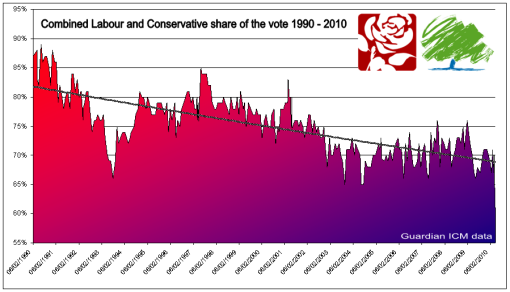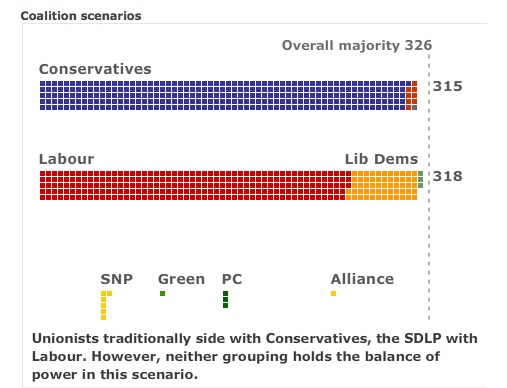From the BBC web site. Suggests that the so-called “Rainbow coalition” is implausible. The Scots and Welsh Nats have explicitly stated that they would not support public-sector cuts in their territories. And of course many Labour MPs cannot abide the SNP.
Category Archives: Politics
So, do the print media really serve democracy well?
PR explained
The strangest thing about this clip is how old it is. It comes from the 1980s. To think that we’re still arguing about this stuff — and that there is no guarantee that, even now, we’ll get any reform of our electoral system. Bah!
Gordon Brown waits for Birnam Wood
Nice Guardian piece by Jonathan Freedland.
As for personal ambition, the virus that brought down Macbeth, those looking kindly on Brown said he was cured of it. "I'm past caring," he mused privately on Friday, when asked about his own position. They point to his statement accepting that Clegg talk to Cameron first, all statesmanlike and above the fray, as if he had made the emotional shift from combatant to referee.
Others see the weekend’s events rather differently. The less charitable version pictures Brown in the No 10 bunker, scheming to cling on. It cites the late-night calls to Clegg – although those who heard them insist they were calm and businesslike – imagining a fevered Brown stabbing jotting pads with his thick pen, totting up the assorted minor parties to see if he could somehow reach the magic number that spelled power.
That the PM saw Clegg again today, in a clandestine meeting at the Foreign Office, confirmed Brown was far from ready to surrender. Instead, this man of uncanny resilience was clearly planning one more resurrection.
Which version is true? Is Brown now the becalmed statesman, planning his exit, or the bloodied survivor, determined to fight on? The likelihood is that, when it comes to Brown – the most psychologically complex figure to inhabit Downing Street since Winston Churchill – the answer is both.
It ain’t over till the fat lady sings.
Everything you need to know about the British electoral system in two easy charts
First of all: the number of votes cast for the three main political parties.
Then the number of seats obtained by those votes:
Check the “Multiple Axes” box if you want the numbers.
Thanks to Michael for alerting me to Timetric.
Quote of the day
“The voting system and the electorate have botched this election. Reality, as it sometimes helpfully does, offers a metaphor for what we’ve done. In Chingford, an Independent candidate decided to do something frightfully amusing and changed his name to ‘None of the Above’. But because of the way names were presented, he appeared as ‘Above, None of the’ – at the top of the ballot.”
John Lanchester, writing in the London Review Blog.
Politics: the state of play
BBC Political Editor, Nick Robinson has this helpful summary.
No party has enough seats to win votes in parliament without the support of members of other parties.
The Conservatives are the largest party with a total of 306 seats in the Commons – which would go up to 307 — if they win the delayed election in Thirsk and Molton – until now, at least, a safe Conservative seat.
If they tried to govern alone they would, in theory, face a combined opposition of 343 MPs.
In reality it’s somewhat different. Sinn Fein won 5 seats – and they don’t take their seats in the House of Commons – so the opposition benches reduce to 338.
A Con/Lib Dem coalition would give them a total of 364 – enough to govern comfortably.
A looser arrangement in which the Lib Dems agreed not to vote against a Tory Budget or the Queen’s Speech would mean 306 or 307 Tories facing a depleted opposition of 281 (that’s 338 – 57 Lib Dems)
If a Lib Dem/Conservative deal fails, Gordon Brown will try to form a government.
If Labour and the Lib Dems joined forces – the extra 57 votes are not enough to make them the biggest force even with the support of the Northern Irish SDLP (who sat on the government benches in the last parliament) and the one new Alliance MP who is allied to the Lib Dems. Together that’s 319 votes.
With the support of the nationalists from Scotland and Wales they would reach 330.
If the DUP joined too and the independent unionist and the new Green MP this alliance would have 338 votes in the Commons.
Be careful what you wish for
That adage has been much in my mind in the last 24 hours. For decades the LibDems (and the Liberals and SDP before them) have dreamed about being the king-makers who could force the two big parties to accept proportional representation.
Now Nick Clegg is a king-maker; well, sort of. I’ve been reading today’s newspapers, and they’re stuffed with contradictory advice and analysis. The Beast (i.e. the British electorate) has inadvertently given itself a taste of what Cabinetformatie (as the Dutch call it) would be like in a fairer voting system.
It looks as though all of Clegg’s options are unpalatable. So the only thing to do is to try and work out some general principles. If I were advising the LibDems, this is what I would say:
So…
Er, that’s it. My consulting rates for political advice are quite reasonable, btw.
Vote for Toxoplasma gondii
Terrific rant by George Monbiot. Sample:
While Labour has liberated billionaires, it has trussed up the rest of us with 3,500 new criminal offences, including provisions that allow the police to declare any demonstration illegal. It has introduced control orders that place people under permanent house arrest without charge or trial. It has allowed the US to extradite our citizens without producing evidence of an offence. It has colluded in kidnapping and torture. Britain now has more CCTV cameras than any other nation, and a DNA database that is five times the size of its nearest competitor. The number of prisoners in the UK has risen by 41% since Labour took office.
This government blocked a ceasefire in the Lebanon; sacked Britain’s ambassador to Uzbekistan after he complained that the regime was boiling its prisoners to death; gave aid to a Colombian military that collaborates with fascist death squads; announced a policy of pre-emptive nuclear war; and decided to waste our money on replacing Trident. But worse, far worse than any of this, it launched an illegal war in which hundreds of thousands have died. This is the government that colleagues of mine on the Guardian want to save.
There’s a parasite called Toxoplasma gondii that colonises the brains of rats, altering their behaviour to attract them to the scent of their predators. The rats seek out cats and get eaten, allowing the parasite to keep circulating. This is New Labour. It has colonised a movement that fought for social justice, distribution and decency, rewired its brain and delivered it to the fat cats who were once its enemies.
Yep. But it still leaves me with the problem of who whom to vote for.
Footnote: Toxoplasma gondii
Inexorable decline…
… in the percentage of the vote going to the two big parties.

The TV debates aren’t responsible for the Hung Parliament that will follow Thursday’s election as surely as night follows day. A quarter of a century of decline in the combined Labour and Conservative share of the vote means that the two party stranglehold over UK politics is on its way out and Clegg’s TV performance was just a tipping point.
One of the wonderful things about the web is the accessibility of data. The Guardian has published all of the Guardian/ICM polling data since 1984. At Election 10 we took the combined Labour and Conservative share for every poll and created the graph above. In 1990 the two parties were claiming almost 90% of the vote between them this has shrunk to a little over 60% and it has been a steady consistent decline. A continuation of this would mean a government taking power that was opposed by around 65% of the population. Even our bizarre electoral system can’t sustain this.
Hmmm… I’m not sure about that optimistic conclusion. The British system can support a good many constitutional absurdities. But isn’t it interesting what a good long run of data can show, eh?
[Source.]


